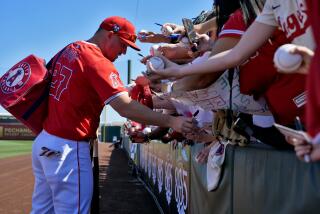Angel Pitcher Used Banned Steroid
- Share via
Angel pitcher Derrick Turnbow on Monday became the first major league baseball player publicly identified as testing positive for a banned steroid.
According to the U.S. Anti-Doping Agency, Turnbow, 25, was at a U.S. national team and Olympic qualifying camp in Tempe, Ariz., when he tested positive Oct. 7 for metabolites of a steroid, either nandrolone or 19-norandrostenedione, both banned by the International Olympic Committee and the World Anti-Doping Agency. The test does not distinguish between the two, officials said.
Turnbow, of Spring Hill, Tenn., said in a telephone interview that he had taken an over-the-counter dietary supplement containing “19-nor,” as the substance is known in gyms and locker rooms. “I didn’t know that what I was taking was going to make me fail a drug test, period,” he said.
In a twist that illustrates the nature of international anti-doping rules as applied to big-league sports in the United States, Turnbow can expect virtually no relevant punishment.
The release of Turnbow’s name also makes plain a matter lost among the many steroid-related controversies that have plagued baseball over the last few months -- with the disclosure by baseball officials that dozen of big leaguers were caught in random tests last season using steroids.
Pitchers, experts said, are just as likely as muscled sluggers to be candidates for steroid use.
“If you have the hand-eye coordination to be a major leaguer, and you can make [yourself] bigger or stronger, please tell me why you wouldn’t be bigger?” asked Charles Yesalis, a professor at Penn State and longtime expert on steroid use in sport.
Anabolic steroids help an athlete build muscle mass, and a bigger, stronger athlete can train longer and harder.
Experts identify 19-nor as a simple chemical modification of androstenedione, which was designed and produced as part of the malignant state-run East German doping program.
“Andro,” as that substance is commonly known, gained widespread attention in 1998 when St. Louis Cardinal slugger Mark McGwire admitted using it while chasing -- and surpassing -- Roger Maris’ single-season home run record.
At the time, andro, available in some over-the-counter dietary supplements, was banned by the IOC but not by baseball. Andro is now banned in the minor leagues but remains unregulated at the major league level.
Turnbow, throwing as hard as 98 mph, dazzled the Angels after returning in September from the minor leagues. He pitched 13 innings, giving up no runs or walks and striking out 12.
“This guy has potential closer written all over him,” Angel Manager Mike Scioscia said in September.
Turnbow finished last season with the big league club and is expected to win a roster spot this spring. Angel General Manager Bill Stoneman, who did not learn of the positive test until Monday, said he was not prepared to discuss what effect, if any, the test might have on Turnbow’s chances.
According to international rules, Turnbow is suspended from Olympic-style competition until October 2006, USADA announced Monday. That suspension, however, probably will prove almost meaningless.
Turnbow was not selected for the U.S. national team that played in Olympic qualifying in November at Panama City.
Further, that U.S. team, composed mostly of minor leaguers, was knocked out of the 2004 Olympics at that qualifying round. There will be no U.S. team at Athens in August.
Under baseball’s rules, taking effect this year, a first-time offender’s positive test does not become public and he will be placed in a treatment program -- with no suspension. Turnbow, however, was tested in 2003, when there was no such sanction.
Turnbow’s identity, and the positive test, were made public Monday because he was tested at the Arizona camp, and then identified, according to protocol overseen by USADA, which oversees Olympic sports in this country.
The camp was directed by USA Baseball, the sport’s Olympic arm in this country. “I keep trying to think about it,” Turnbow said.
“What happened is bad publicity. But it had nothing to do with Major League Baseball. I stepped across a line and volunteered for USA Baseball. I failed by their standards. I never would have failed a drug test if I hadn’t volunteered for USA Baseball.
“That’s what’s so hard for me.”
Rob Manfred, MLB’s executive vice president of labor relations, said officials were aware of the positive test, adding only that Turnbow’s case “would be processed in accordance with major league drug policy.”
Gene Orza, the players’ union’s associate general counsel, could not be reached for comment.
In November, baseball officials announced that 5%-7% of 1,483 tests conducted last year on big leaguers had come back positive for steroids, more than enough to fill two major league rosters.
Times staff writer Bill Shaikin contributed to this report.
More to Read
Go beyond the scoreboard
Get the latest on L.A.'s teams in the daily Sports Report newsletter.
You may occasionally receive promotional content from the Los Angeles Times.






